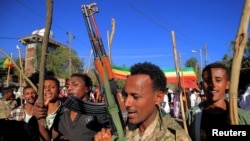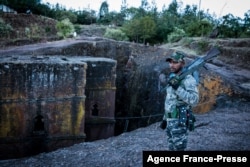The Ethiopian Human Rights Commission, a public independent institution, estimated in February that at least 45 people were killed on January 29 by government forces in Merawi city after clashes with local militia Fano.
According to testimonies collected by the New York-based rights group, after the Fano withdrew from Merawi, Ethiopian soldiers shot civilians on the streets as well as during house raids over a six-hour period.
"The soldiers also pillaged and destroyed civilian property," HRW said in a statement.
It said the incident "was among the deadliest for civilians during the fighting between Ethiopian federal forces and Fano militia since the outbreak of fighting in Amhara in August 2023."
HRW urged the UN High Commissioner for Human Rights to launch an independent inquiry into abuses in the region.
The NGO called on the African Union to suspend all deployments of Ethiopian federal forces to peacekeeping missions until "commanders responsible for grave abuses are held accountable."
Laetitia Bader, the group's deputy Africa director, said: "The Ethiopian government's failure to ensure meaningful accountability for abuses by federal and regional forces contributes to ongoing cycles of violence and impunity."
The deliberate killing of civilians has become a "daily occurrence" for Ethiopians in conflict zones, she said.
In early February, Ethiopia's parliament extended a state of emergency introduced in August 2023 in Amhara — the country's second most populous region — in an attempt to quell a so-far unsuccessful Fano insurgency.
The Fanos and other Amharas felt betrayed by a peace agreement signed in November 2022 by the government and dissident leaders of the Tigray region — long-time foes of Amhara nationalists who claim parts of Ethiopia's northernmost region as their ancestral lands.












Forum